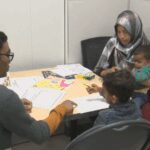The controversial Education Reform Bill 33 continues to stir debate across Toronto’s diverse parent communities, with mounting concerns about potential overreach into family decision-making.
During last week’s packed community forum at the St. Lawrence Community Centre, I witnessed firsthand the emotional intensity this legislation has ignited. Parents from various religious and cultural backgrounds voiced their apprehensions about provisions they fear could diminish their role in their children’s moral education.
“This bill feels like it’s placing government authority above parental rights,” said Maria Gonzalez, a mother of three and community organizer from Scarborough. “We’re not opposed to inclusive education, but families need to remain the primary moral compass for their children.”
The legislation, introduced last month by Education Minister Charlene Francis, aims to modernize Ontario’s education framework with expanded anti-discrimination measures and updated curriculum guidelines. However, certain sections have triggered alarm among religious communities who worry about potential conflicts with their faith traditions.
Catholic school boards have been particularly vocal, with the Ontario Catholic School Trustees’ Association expressing “serious reservations” about language they believe could compromise their constitutionally protected denominational rights. Their concerns echo similar sentiments from Jewish, Muslim, and Evangelical Christian parent groups across the GTA.
“We value our diverse, multicultural society,” explained Rabbi David Stern of Beth Shalom Congregation. “But there must be reasonable accommodation for deeply held religious beliefs while still ensuring all students feel respected and included.”
The bill’s most contentious provisions involve parental notification protocols and curriculum content approval processes. Section 17B stipulates that schools may, in certain circumstances, implement specialized programming without prior parental consultation – a measure supporters defend as necessary for student wellbeing but critics view as governmental overreach.
City Councillor Joanne Parker, who attended the forum, acknowledged the tension. “We’re trying to balance competing rights here – the rights of parents to guide their children’s education and the rights of all students to feel safe and included. Finding that balance isn’t easy.”
Ministry officials maintain the legislation has been mischaracterized, pointing to specific provisions that actually strengthen parental involvement in school governance. Deputy Minister Richard Thompson emphasized that “the bill explicitly enhances parent council authority in curriculum review processes.”
Polling data reveals a divided public. A recent Maru Public Opinion survey found 47% of Toronto residents support the bill’s general framework, while 38% express significant concerns, with the remainder undecided.
Education policy expert Dr. Aisha Khanna from Ryerson University suggests the controversy reflects deeper societal tensions. “We’re witnessing the complex intersection of religious freedom, parental authority, and the state’s educational mandate. These aren’t easily reconciled.”
As the legislation advances to committee hearings next month, parent advocacy groups are mobilizing. The Coalition for Parental Rights plans a Queen’s Park rally while collecting signatures for a petition requesting amendments to the bill’s most disputed sections.
For Toronto’s diverse communities, the outcome remains uncertain. What’s clear is that finding common ground between protecting religious freedom and advancing inclusive education policies will require thoughtful dialogue and a willingness to compromise from all parties involved.







